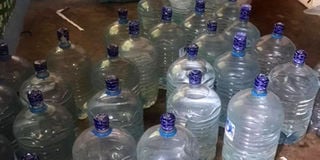Halal water to be taken off market

Confiscated. Some of the water bottles that were confiscated from the factory in Old Kampala. COURTESY PHOTO
What you need to know:
- Mr Musa Jjunju from Halal and Twayibah Foods & Beverages factory, said engagements were underway to resolve the matter.
Kampala. Uganda National Bureau of Standards (UNBS) has said it plans to pull Halal water off the market.
This follows the closure of the Halal and Twayibah Foods & Beverages factory in Old Kampala.
“The products found in the public will be removed from the market, but when we had an interaction with the manufacturer, he said he was supplying within the Moslem community in Mengo,” Ms Barbara Kamusiime, a senior public relations officer at UNBS, said.
The factory was last week closed over failure to comply with set standards for production of beverages, which UNBS said was putting the health of consumers at risk.
Through a joint task force comprising Kampala Capital City Authority (KCCA) as well as UNBS, it was discovered that production of pre-packaged drinking water of Halal brand was in an unhygienic environment.
“The workers were found handling water with bare hands and with no safety gear which is a contravention of the ... code of practice for hygiene in the food and drinks manufacturing industry,” read a statement issued by UNBS.
The beverage company was also found to be forging the UNBS distinctive mark yet it is not certified.
This, UNBS said, is in contravention of the law which guides water manufacturing standards, which prohibits the sale of uncertified packaged drinking water.
Samples of the water were taken for testing, a process which could last two months, after which the manufacturer will be sent to court for prosecution.
Mr Musa Jjunju from Halal and Twayibah Foods & Beverages factory, said engagements were underway to resolve the matter.
“We are going to arrange our matters with city council [KCCA] and UNBS,” he said.
According to UNBS, water products are one of the safest on the market with over 98 per cent of them being certified.



